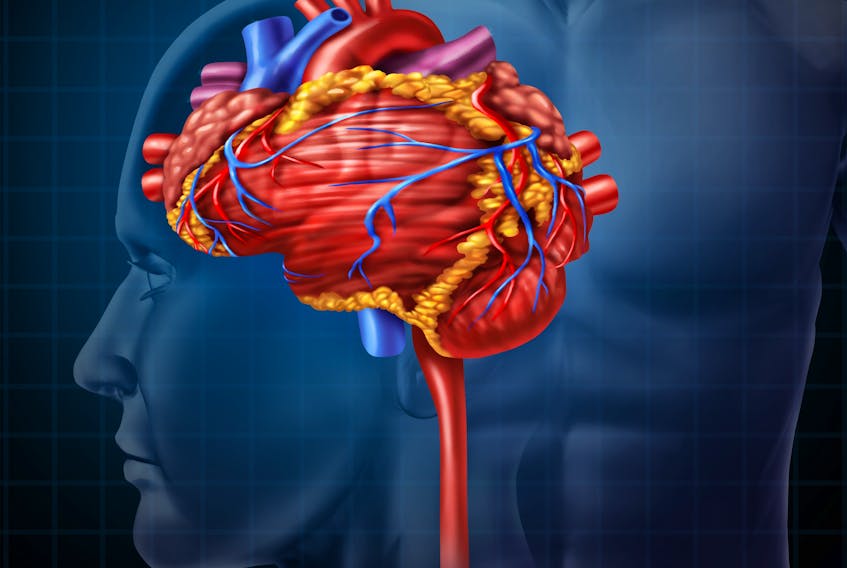Connections between cognitive decline and vascular disease have led to some ground-breaking discoveries.
A 10-year-study conducted by the Heart and Stroke Foundation shows a correlation between the two conditions. Results from the study showed that from 2007-17, hundreds of thousands of Canadians were affected, with the numbers steadily growing over that decade, and it’s significantly worse for women than for men.
An example of this would be someone with a heart condition. That person has increased odds of risk of not only stroke, but of cognitive impairments, of which dementia is said to be the worst outcome.
“There is a critical need for better understanding of the complex heart-brain-mind connections. This will inform our approaches to prevention as well as streamline more integrated health system design and delivery,” Anne Simard, chief mission and research officer with the Heart and Stroke Foundation, said in the 2019 Heart and Stroke Report.
“Ultimately we want fewer people to be diagnosed with these conditions. For those who do experience them, we hope they can use their energy to focus more on their own recovery and experience a better quality of life rather than having to navigate a fragmented health system,” she added.

The reports on heart disease and stroke in 2018 shows that women in Canada are under-researched, under-diagnosed, under-treated and under-supported during recovery, and under-aware of their risks.
“In this report, where we expanded our examination to focus on additional conditions of the heart, brain (stroke) and mind (vascular cognitive impairment), we again discovered notable differences between men and women, showing that women are at even greater risk than we previously knew,” Simard said.
“This reinforces the inequities highlighted in 2018 and strengthens our resolve to reduce the impact of all heart, brain and mind conditions on women’s lives.”
Vascular cognitive impairment ranges from mild problems with concentration and thinking, to more severe and widespread problems such as dementia, causing difficulty performing even basic tasks such as getting dressed and bathing.
How symptoms present
Systematically mapping and trending people throughout that timeframe shows that the heart and the brain are much more deeply connected to each other than first expected.
The analysis revealed that people who suffered from vascular issues will most likely develop additional conditions that won’t present to the sufferer until, many times, it does irreparable harm.
According to the study, the conditions that are attached to this are not being treated until they reach a crisis level due to the heart and brain being connected by the vascular system and many times don’t get the attention they deserve by the health system.
That often causes delays in diagnosis, treatment and secondary prevention, and causes stress, fear and unnecessary suffering for the patient and family.
Heart & Stroke is raising awareness and calling on health providers and system leaders to work together to create a streamlined, patient-centred health system.
The overlap between stroke and vascular cognitive impairment is not surprising given both are conditions of the brain. Vascular cognitive impairment is often a further result of stroke damage, from either one or more larger strokes or many smaller ones accumulating over time. Surprisingly, this link goes both ways — people with vascular cognitive impairment are at increased risk of stroke.
“The heart, brain and mind are at the core of everything, including our health,” Yves Savoie, CEO, Heart & Stroke, said in a news release Wednesday.
“The heart, brain and mind are at the core of everything, including our health." — Heart and Stoke
“We mapped the connections between heart, brain and mind diseases and conditions for the first time and found even stronger links and a much greater impact than anticipated. People managing these conditions are overwhelmed and the system is overloaded. This is a crisis and it is not sustainable. We need to find solutions now,” he added.
Now, strong evidence is emerging around the link between heart function and cognitive function. When the heart is not functioning properly it can cause decreased blood flow to the brain. For example, conditions such as atrial fibrillation and heart failure put people at significantly increased risk for not just stroke, but also for premature cognitive decline.
The Heart & Stroke Foundation is working to be a catalyst for change by influencing and supporting people, lobbying government and influencing health systems, services and providers to provide the new knowledge, data and energy that bring together diverse organizations and people to improve prevention and management of heart, brain and mind conditions and support people living with them.
By The Numbers
As researchers advance their understanding of the connections between the heart, brain and mind, most people are unaware of these connections, and the extent of their impact is only starting to become clear:
• 91,524 people in Canada died of heart conditions, stroke or vascular cognitive impairment in 2016. This equates to one out of every three deaths.
• One person dies in Canada every five minutes from a heart condition, stroke or vascular cognitive impairment.
• 40 per cent of people admitted to hospital with a heart condition, stroke or vascular cognitive impairment will be readmitted at least once more for another similar event or a different heart, brain or mind condition.

• There is a negative impact on health outcomes for people with multiple conditions, including decreased quality of life and increased mortality.
• People with more than one of these conditions are up to eight times more likely to die in hospital compared to those with only one condition.
Source: © 2019 Heart and Stroke Foundation of Canada
Resources
Heart & Stroke provides resources to support individuals and their families, most of which are available at heartandstroke.ca.
They include:
• Signs of heart attack and cardiac arrest
• Working with your doctor: Practical tips to help you understand and manage your risk factors
• Community of Survivors and Care Supporters Community: Members-only Facebook groups for those living with heart disease or stroke or caring for someone who is. heartandstroke.ca/connect
• Time to See Red: Women are under-researched, under-diagnosed and over-dying. Learn more at heartandstroke.ca/women.
• Living with Heart Failure: Resources to help you manage your heart failure (PDF)
• Living Well with Heart Disease: A guide for people with coronary artery disease (PDF)
• Your Stroke Journey: A guide for people living with stroke (PDF)
• Post Stroke Checklist: A resource to help you and your care team manage your recovery (PDF)
• Stroke Best Practices: This site for health care professionals includes resources for patients and families. strokebestpractices.ca
Source: © 2019 Heart and Stroke Foundation of Canada
Stroke is on the rise
An Ischemic stroke, caused by a blood clot, occurs in 85 per cent of all stroke patients. A hemorrhagic stroke occurs in the remaining 15 per cent, when a blood vessel ruptures, causing bleeding in the brain.
A transient ischemic attack (TIA) — sometimes referred to as a mini-stroke — is caused by a small clot that briefly blocks an artery. More than 62,000 strokes occur in Canada each year and that number continues to rise, leaving more than 405,000 people in Canada living with the effects of stroke.
Women are disproportionately affected by stroke: 45 per cent more women die of stroke than men in Canada, and because they live longer, more women are living with the effects of stroke.
Connections by the numbers:
• 10 per cent of people who have a stroke already have some vascular cognitive impairment.
• Another 10 per cent will develop vascular cognitive impairment after their stroke.
• 30 per cent of people who experience a second stroke are at risk of developing vascularcognitive impairment.
• Women with stroke related to Afib have worse outcomes than men.
Source: © 2019 Heart and Stroke Foundation of Canada









